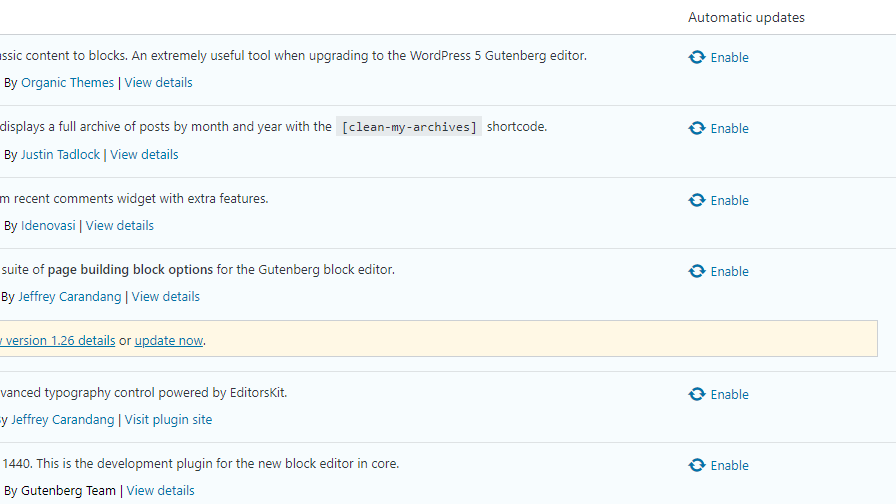
Today, Jean-Baptiste Audras announced the WordPress Auto-updates feature plugin. The project seeks to bring automatic plugin and theme updates to WordPress version 5.5. It was originally slated as a feature project in 2019, but it was later bumped to the 2020 roadmap.
The WordPress Auto-updates plugin is available for beta testing in the plugin directory. The plugin is currently marked to work with sites running PHP 7.2 or later, which is odd considering it is a feature plugin for core and will need to be compatible with WordPress’ minimum of PHP 5.6.
The feature feels long overdue. We have been asking for it since at least 2015 here at the Tavern. Hosting companies and plugins like Jetpack have taken up the load over the years, offering automatic updates for millions of users. However, it is time for the core platform to take the reins and make this a feature available directly to all users. This would also provide a standardized path for third-party plugins to extend the feature with more controls for end-users.
Work toward bringing the feature into core WordPress originally began in the plugin auto-updates and theme auto-updates Trac tickets. The code contributed to those tickets are now in the feature plugin. “WordPress contributors did a lot of work on the two related tickets during WP 5.4 development cycle, but decided to give it more time for testing as it’s an important feature,” wrote Audras in the announcement.
Development is currently taking place on Audras’s GitHub repository, but it may be moved to the official WordPress GitHub account.
One of the primary goals of the project is to create an admin UI, which would give users the ability to manage how automatic updates work. Users will be able to enable or disable auto-updates on a plugin-by-plugin and theme-by-theme basis. This level of fine-grain control is welcome. While I generally prefer to auto-update everything, I have been burned by specific plugins and themes in the past. For those, I often prefer to update within a test environment first to be on the safe side. Undoubtedly, other users may find themselves in a similar situation. It is nice to see this being taken into account as a goal of the project.
The project plans to set up email notifications for site administrators that will summarize any auto-updates that happen on the site. There will also be hooks and PHP constants to allow plugin developers to take control of the update settings.
As usual, most of the completed work on the automatic updates roadmap has gone toward plugins. Just once, it would be nice to see a feature that crosses into both theme and plugin territory be completed for themes first. I only hope that themes do not end up taking a backseat due to time constraints, development hurdles, or anything else.
I really like the option to select what you want to auto updates for themes and plugins. In the long run, it will be beneficial for the community but for us, as a web design agency selling care plans, we have to position yourself more on support our customers and less on core/theme/plugins updates.